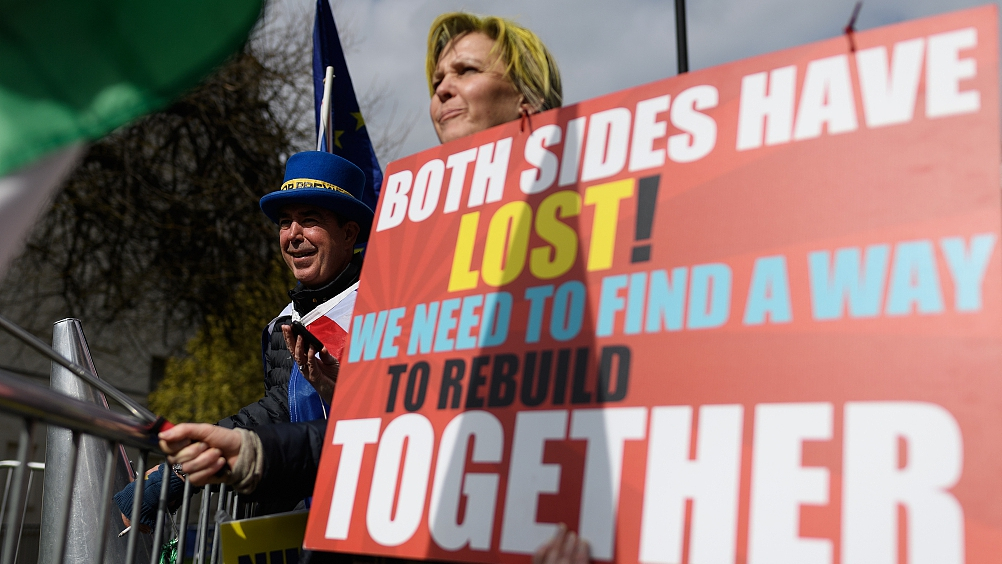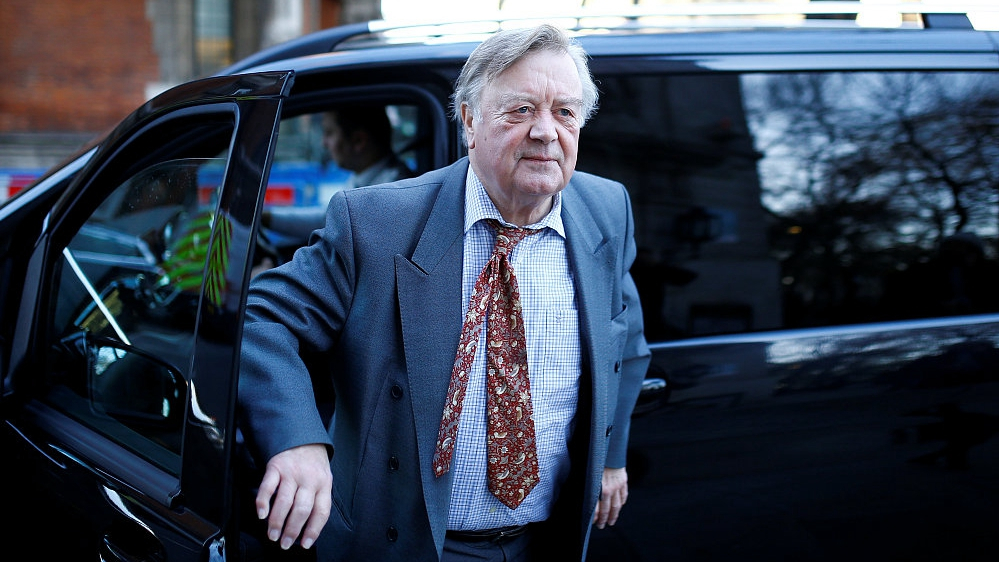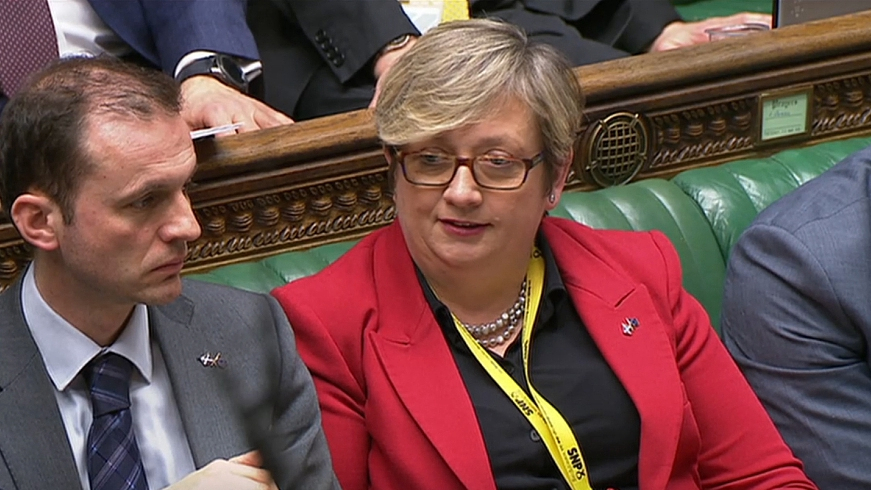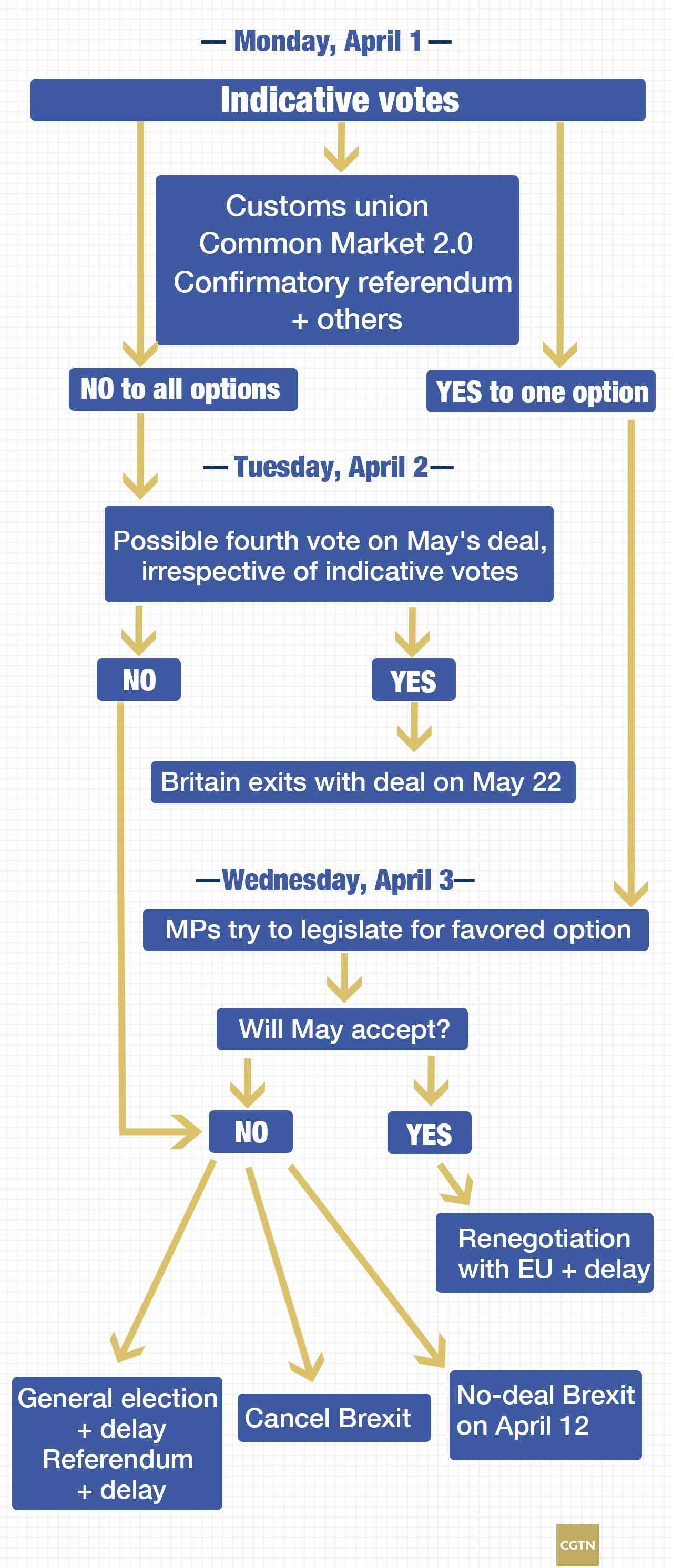
Europe
15:20, 01-Apr-2019
Eight Brexit options on table as MPs cast indicative votes
Updated
20:01, 01-Apr-2019
By John Goodrich

British Members of Parliament (MPs) will cast indicative Brexit votes for the second time on Monday in an attempt to find a way out of the European Union.
Read more:
The first round of votes indicated a preference for a softer exit than Prime Minister Theresa May's deal, but none of the eight options won majority support.
What are the options?
Eight proposals have been put forward, but it's unlikely all will be voted on. House of Commons Speaker John Bercow will select which of the following will be put to MPs:
1. Quit the backstop, anytime
First round: Proposed, but not selected for vote.
What is it? Britain leaves the EU on May 22 with Prime Minister Theresa May's withdrawal agreement amended so that Britain could unilaterally exit the contentious Irish backstop.
Can it win? Conservative MP John Baron's idea is popular among Brexiteers but the EU has repeatedly said it will not reopen the withdrawal agreement, so it seems an unrealistic option.
2. No withdrawal agreement, no deal
First round: Rejected by 400 votes to 160.
What is it? Britain leaves the EU without a deal on April 12, if May's withdrawal agreement is not passed.
Can it win? A no-deal has been repeatedly rejected in parliament, including when Conservative MP Baron proposed it last week. That's not to say a no-deal cannot happen by accident, however, it remains the default on April 12 if nothing else changes.

Conservative MP Kenneth Clarke in central London, December 11, 2018. /VCG Photo
Conservative MP Kenneth Clarke in central London, December 11, 2018. /VCG Photo
3. Customs union membership
First round: Rejected by 272 votes to 264.
What is it? The UK joins a customs union with the EU as part of its exit deal.
Can it win? Permanent customs union membership won cross-party support last week, going down by just eight votes, and has a chance of victory on Monday. Veteran Conservative Ken Clarke's plan would largely negate the Irish border issue, but also make striking post-Brexit trade deals difficult – which is why many of his party colleagues oppose it.
4. Common Market 2.0
First round: A similar proposal was rejected by 283 votes to 189.
What is it? Membership of the EU single market and a customs arrangement.
Can it win? Conservative MP Nick Boles has tweaked his proposal since last week, and it is not too far from Labour's plan. However, it involves membership of the single market which in turn requires freedom of movement – this is a problem for many MPs.
5. Public vote on any deal
First round: Rejected by 295 votes to 268.
What is it? A public vote to approve any Brexit deal.
Can it win? The proposal by Labour MPs Peter Kyle and Phil Wilson has been floating around for several weeks, and had initially been expected to be voted on as an amendment to May's deal. It is likely to be backed by Labour, and has a chance of victory – though there were few abstentions in last week's 27-vote defeat, so there's little room for maneuver.
6. No deal? Ask the public
First round: Not proposed.
What is it? A public vote to prevent Britain leaving the EU without a deal.
Can it win? The proposal from Labour MP Graham Jones and Conservative Dominic Grieve is the only wholly new option and as such is untested. A majority of MPs are opposed to no-deal, so this could be a way of preventing that outcome from happening by default.

SNP MP Joanna Cherry, during the Brexit debate in the House of Commons, London, March 12, 2019. /VCG Photo
SNP MP Joanna Cherry, during the Brexit debate in the House of Commons, London, March 12, 2019. /VCG Photo
7. No delay, no no-deal? No Brexit
First round: A broadly similar proposal was rejected by 293 votes to 184.
What is it? Request a further Brexit extension if no agreement is struck within two days of the exit date. If a delay is not agreed, MPs vote on leaving without a deal. If MPs oppose a no-deal, the government revokes Article 50 and cancels Brexit.
Can it win? SNP MP Joanna Cherry last week proposed revoking Article 50, but has now added detail to the formula. It still essentially calls for Brexit to be cancelled, and so is a particularly controversial option, but the extra layers may provide cover for greater support.
8. Single market membership
First round: A similar proposal was rejected by 377 votes to 64.
What is it? Britain remains a member of the European Economic Area and seeks a further short delay to Brexit to rejoin the European Free Trade Association – essentially remaining in the single market.
Can it win? The margin of defeat last week makes it an unlikely proposal to be voted on.
What happens next?
The votes are non-binding, meaning the government does not have to accept the results – though it would be under pressure to do so. If a majority is found for one option, MPs will try to legislate to force the government to pursue that choice.
The most popular alternatives are likely to be difficult for May to pursue, and she is expected to press for another vote on her own plan on Tuesday. If the prime minister's deal isn't passed, she may try to avoid negotiating an alternative plan by trying to force an election.
Whichever route May ultimately takes – unless her deal is passed – risks splitting her Conservative Party, with resignations likely to follow either a soft or no-deal direction.


SITEMAP
Copyright © 2018 CGTN. Beijing ICP prepared NO.16065310-3
Copyright © 2018 CGTN. Beijing ICP prepared NO.16065310-3